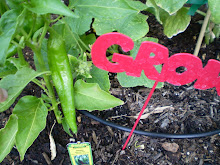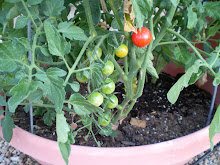My paternal grandmother had a garden. In spite of her small cottage style house in a very urban part of Albuquerque, she had a delightfully large backyard. Her garden was mostly vegetables and to feed it, she had a compost pile. After we prepared meals, we would take the food scrapes out to her compost pile. From my little Cajun grandmother I first learned the value of recycling.
As a result of this fond childhood memory, gardens have always held a place of intrigue in my mind. Although I did not inherit my grandmother's green thumb, and have a potted plant graveyard next to my house to prove it, I continue to imagine one day having my own thriving vegetable and flower garden.
I tell you this because recently I came across a lovely analogy likening gardens to the mind. I found the analogy as I was rereading "Stroke of Insight," the true story of Jill Bolte Taylor, PhD, who experienced a brain hemorrhage in her left brain. As a neuroanatomist, Dr. Bolte describes with amazing skill the anatomy of the brain, the location of her hemorrhage and why her disabilities manifested as they did. She also describes the insights that her stroke made possible, e.g. the name of her book, "Stroke of Insight." The excerpt about tending the garden of the mind is a beautiful example of such an insight:
"I view the garden of my mind as a sacred patch of cosmic real estate that the universe has entrusted me to tend over the years of my lifetime... Regardless of the garden I inherited, once I consciously take over the responsibility of tending my mind, I choose to nurture those circuits that I want to grow, and consciously prune back those circuits I prefer to live without. Although it is easier for me to nip a weed when it is just a sprouting bud, with determination and preserverance, even the gnarliest of vines, when deprived of fuel, will eventually lose its stength and fall to the side."
I see so many wonderful themes in this paragraph. First, I love the idea of "the garden I inherited." This reminds me of how much we like to blame our parents for our shortcomings. Our parents may have served as less than perfect role models for certain behaviors, or they may have simply encouraged certain behaviors in our own personality that ended up being destructive later in life. Regardless of our past parental influences, Dr. Bolte asserts that we must, at some point in our lives, take responbility for our garden and at that time, give up blaming anyone else for the outcome! How many times have we made comments indicating our childhood as the culprit for our recent dilemma. "If only mom hadn't rewarded me with chocolate, I would crave it less now that I am an adult!" Taking responsibility for the garden of our mind means no more blaming Mom and Dad!
Next, Dr. Bolte asserts that one can and should make a conscious effort to tend the neural circuits that benefit our sense of well being and prune the circuits that sabotage our mental state. In considering this section, I realized that I treat my physical body much differently than I treat my mind. If I have a goal for my physical body, I steadily work towards it employing good habits that I reinforce daily. I work out, do yoga, try to eat right and take my vitamins. I avoid certain foods that make me feel sick to my stomach, or bloated. I stretch after exercise to avoid straining muscles. I consider how my body feels and alter my behavior accordingly.
When considering my mind, I behave like a victim of my thought process. I sit back and let my mind race, as if I have no control over where it goes. I engage in negative trains of thought that make me feel anxious, angry, sad and fearful, and make no effort to alter them. Dr. Bolte's apt description reminds me that I can affect how my mind works by recognizing how certain thoughts make me feel, and working steadily, day after day, to filter them out until their neural circuit becomes less and less automatic.
Finally, and most importantly for me, is that "even the gnarliest of vines, when deprived of fuel, will eventually ... fall." To consider getting my mind in shape, I become most overwhelmed by my deeply ingrained negative mental habits. For example, since childhood I have had this habit of imagining worst case scenarios. From imagining my own death and funeral, to those of my loved ones, these stress-inducing daydreams have persisted into adulthood. My most favorite one recently is this: "What if someone breaks into my house? What if I can't find my phone to call the police? How would I protect myself and, more importantly, my dogs?" I can take myself from almost asleep to alert, pulse racing, shoulders tightening, totally anxious in a matter of seconds. This is a deeply ingrained habit that fuels my own anxiety. To think that I can uproot this gnarly vine of self-perpetuating anxiety with steady mental exercise is very meaningful for me.
Overall, Dr. Bolte's excerpt reminds me that I have not only the responsibility, but indeed the capability to tame the wild vines growing in the garden of my mind. This accountability is both enlightening and empowering. I know it doesn't happen overnight, but every ounce of awareness that I apply to how my mind works will take me closer to that beautiful garden that I was meant to grow!
Monday, July 13, 2009
Subscribe to:
Posts (Atom)








